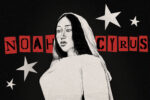First off: What even is Southern Gothic music? It’s certainly not just the soundtrack for the new HULU true crime series. It’s a niche genre, for sure — and a little hard to define at that — but let’s try.
Southern Gothic as a music genre relates back to the 20th-century literary subgenre of the same name, one known for employing “macabre, ironic events to examine the values of the American South.” As a child of the broader Gothic genre, Southern Gothic enjoys the creepy and grotesque nature of Dark Romanticism — think Edgar Allen Poe — but with distinct references to the American South.
The American South is an extremely haunted region — thrilling ghost stories and tales of the uncanny aside, the bloody legacies of slavery, the Civil War, Jim Crow and ongoing racism haunt its identity and always will. Its land is quite literally soaked with blood, and its music can be appropriately dark and grim. Southern Gothic broadly explores madness, decay, ruin, damnation and the disillusioned values of old Southern gentility. It grapples with the myth of the idyllic antebellum South while appropriating some of its aesthetics. Like most good art, it was born out of deep spiritual confusion and a yearning for identity, community and inheritance.
The Sonics of Southern Gothics
If you hear a song talk about the devil stealing your soul, challenging you to a banjo playoff or going down to Georgia (basically anything that uses the word “devil”); or that makes you feel like you’re being chased through a foggy forest by a pack of hellhounds; or like you’re sitting under Spanish moss in a crumbling, 200-year-old graveyard, chances are you’re listening to Southern Gothic.
Also called dark folk, Southern Gothic music generally employs lots of string instruments, like the banjo or the bass. The acoustic is often undergirded with heavy percussion that builds momentum and shows the rock influence that moves Southern Gothic further away from country, especially the more monotonous modern stadium country. Vocals typically include an eerie blend of blues, country and gospel music.
The whole genre is a fascinating melting pot of rock, Western, folk, blues, old-time and traditional Appalachian ballads with their own Scottish-Celtic background. Unlike most musical genres, Southern Gothic is defined more by its regional subject matter and elusive vibes than one distinct sound. So, if you’re looking to discover a new genre, check out these songs.
1. “Bottom Of The River” by Delta Rae
“Bottom Of The River” appeared on Delta Rae’s first album, “Carry The Fire,” and remains one of their most popular songs to date. The impassioned work song is buoyed by the beat as well as multiple voices that add to the beat in snaps and hums. The traditional instruments take a backseat in this tune.
Southern Gothic is about providing a haunting quality, after all, and what’s more haunting than naked vocals? The band embodies the “interdisciplinary” approach of Southern Gothic. By the North Carolina band’s own definition, they make “gospel-tinged country-rock, sensual blue-eyed soul and harmony-laden Americana.”
In the music video, lead vocalist Brittany Hölljes plays a young woman accused of witchcraft. During the Salem witch trials, women famously faced bogus trials, such as being thrown in the water. If they drowned, their name was cleared in death; if they could float, they were condemned as a witch and killed anyway. They were, quite literally, damned if they did and damned if they didn’t. The chorus sings, “Hold my hand / Ooh, baby, it’s a long way down to the bottom of the river.”
2. “Blood on My Name” by The Brothers Bright
“Blood on My Name” hits all the Southern Gothic buzzwords. Graves? Check. Reckonings and hounds of hell? You bet. It’s got Southern Gothic’s signature spiritual torment in spades. The song alludes to the biblical tale of Lazarus of Bethany, a man Jesus resurrected from the dead. In this rendition, the singer begins, “There’s a reckonin’ a-comin’, and it burns beyond the grave / Lead inside my belly ’cause my soul has lost its way / Oh, Lazarus, how did your debts get paid?”
3. “Bartholomew” by The Silent Comedy
Like “Blood on My Name,” “Bartholomew” explicitly invokes a biblical narrative from a sinner’s point of view. In addition to mentioning the sacrament of Baptism, especially performed in a river, the song is given the name of one of Jesus’ 12 disciples.
The song starts with the guilty lament: “Oh my God please help me knee deep in the river trying to get clean / He says wash your hands get out the stains / But you best believe boy there’s hell to pay,” and it ends with a resigned cry: “Swing sweet Seraphim take me back again or watch me make the messes of men.”
4. “Ain’t No Rest for the Wicked” by Cage the Elephant
Kentucky-based alternative rockers Cage the Elephant capture the Southern Gothic narrative spirit in their upbeat hit “Ain’t No Rest for the Wicked.” Though less creepy and more playful, the song, with its sinning preacher men and downtrodden souls, fits the sardonic nature of Southern Gothic.
In the catchiest way possible, the group discusses disappointment in the hypocrisy of religious officials only to eventually find comfort in the universality of hedonism. They sing, “I saw a preacher man in cuffs, he’d taken money from the church / He’d stuffed his bank account with righteous dollar bills / But even still I can’t say much because I know we’re all the same / Oh yes, we all seek out to satisfy those thrills.”
5. “The Devil’s Gotta Earn” by Brett Detar
“Everybody else is doin’ everybody wrong,” as well, in Brett Detar’s “Devil’s Gotta Earn.” The foot-tappin’, string-happy melody remains playfully ironic as Detar sings oxymoronic lines like, “I been drinkin’ poison and hopin’ you’d fall ill.”
6. “Filthy Dirty South” by Rising Appalachia
The guitarist-singer duo composed of sisters Leah and Chloe Smith tackles environmental abuses in the American South and negative stereotypes of the region in “Filthy Dirty South.” Their stubborn pride sits side by side with their anger as they sing lines like: “And yes I love my filthy dirty South / So we are all led like lambs to the slaughter / While the big corporation f— up our water.”
They write in their YouTube music video description, “This song and video offer a lyrical analysis of our southern regions and the onslaught of environmental abuses laid onto sacred lands. The lyrics touch on the Gulfcoast oil spill, Mountain top removal, and fracking, and beg the question WHY is this south is so ‘filthy Dirty.’”
7. “In Hell I’ll Be In Good Company” by The Dead South
Like “Bottom of The River,” this song relies on the voices of its band members and a single bass. Though not from the United States South, The Dead South, “a self-styled 4-piece string band from Regina, Saskatchewan” in Canada, captures the grittiness and catchiness of Southern Gothic. Their website reads, “Their sound, built on a taut configuration of cello, mandolin, banjo and guitar, speeds like a train past polite definitions of acoustic music into the grittier, rowdier spaces of the bluegrass world.”
As one YouTube commenter writes, “The one guy has the vocal range i can only describe as broken glass and honey, and I’m 100% here for it.” This could apply to any of the band members we see charmingly singing and “dancing” in the simple yet engrossing music video.
8. “Old Time Religion” by Parker Millsap
In “Old Time Religion,” Parker Millsap covers the old gospel tune of the same name but with a dark twist. In this version, Millsap describes a devout man who misconstrues the Bible to manipulate and abuse those around him. The song ends with betrayal and murder (bread and butter for Southern Gothic), a fitting conclusion to Millsap’s cutting take on an evil social reality.
9. Ain’t No Grave” by Crooked Still
“Ain’t No Grave” is a widely covered and popular gospel song composed by Claude Ely when he was sick with tuberculosis in the ‘30s. It was initially recorded by Bozie Sturdivant in 1941 in a slowed-down, Appalachian gospel style, then later by Sister Rosetta Tharpe. Other well-known versions include the cover found on Johnny Cash’s posthumous album “American VI: Ain’t No Grave.” Crooked Still, a “neo-bluegrass group” led by singer Aoife O’Donovan, takes their shot at the tune here.
10. “South Gotta Change” by Adia Victoria
Last, but definitely not least, Adia Victoria gets at the reparative heart of Southern Gothic by tackling regional issues like white supremacy head-on and with moral clarity. In “South Gotta Change,” Victoria sings about loving a place enough to want what’s best for it, even if, or especially if, that involves radical social change and restructuring. She sings, “You’ve been running from the ghost / You keep it hidden in your past / The veil before your face is falling, and it’s falling fast.”
In an interview, Victoria spoke about writing the song in 2020, saying, “But last summer, this was right around the period when representative John Lewis left us, and it was also immediately following the lynching of George Floyd. I was sitting outside on my back porch, and it was so hot, like in June, I was burning up. It’s that heat in the south where it’s not just hot, it’s humid, so it sticks to you. It’s claustrophobic and it frustrates you, and I remember feeling very frustrated. I remember thinking about the south, like, what would you say to someone that you loved that was running from themselves, that was so terrified of their past, terrified of the things that they did. They smothered it and covered it in lies. They projected they blamed. They’re just haunted by their past. What would you say to someone that you loved and you saw them? And that’s kind of my experience with the south, like, I love it here. I’m a Carolina girl. I’ll die here. I’ll die for this place. And I don’t let nobody talk mean about it either. But I’m just like, ain’t you tired? Aren’t you tired of running, aren’t you tired of pretending?”
At the heart of Southern Gothic lies the reason the genre is defined by subject matter over style, split identity and the need for healing. It dramatizes the haunting in the hope of redemption. It tackles the question, “Where do we go from here?” Victoria sings, “’Cause I love you, I won’t leave you / Won’t let you slip away / Come what may / We’re gonna find a way / The South gotta change.”

















